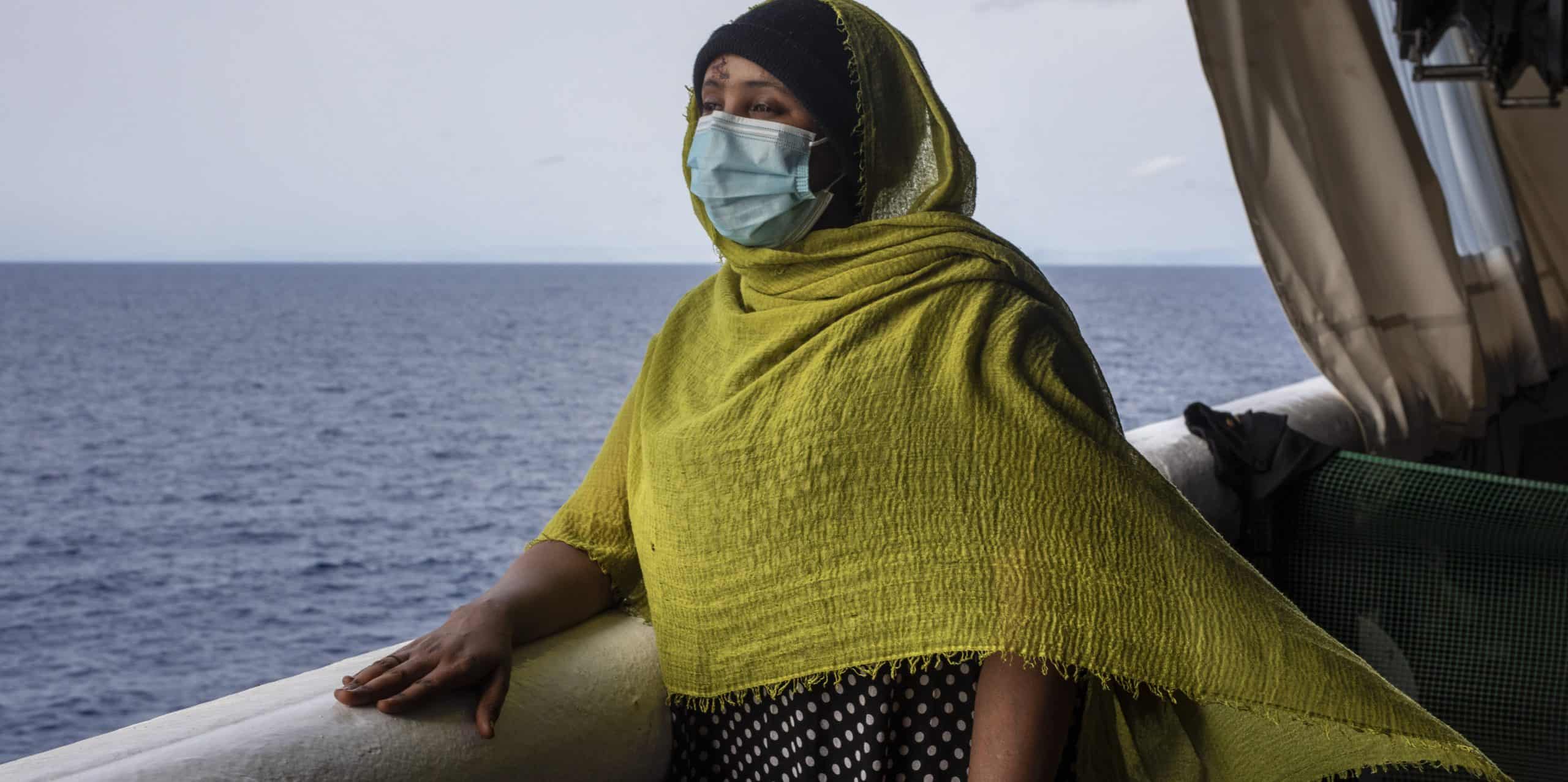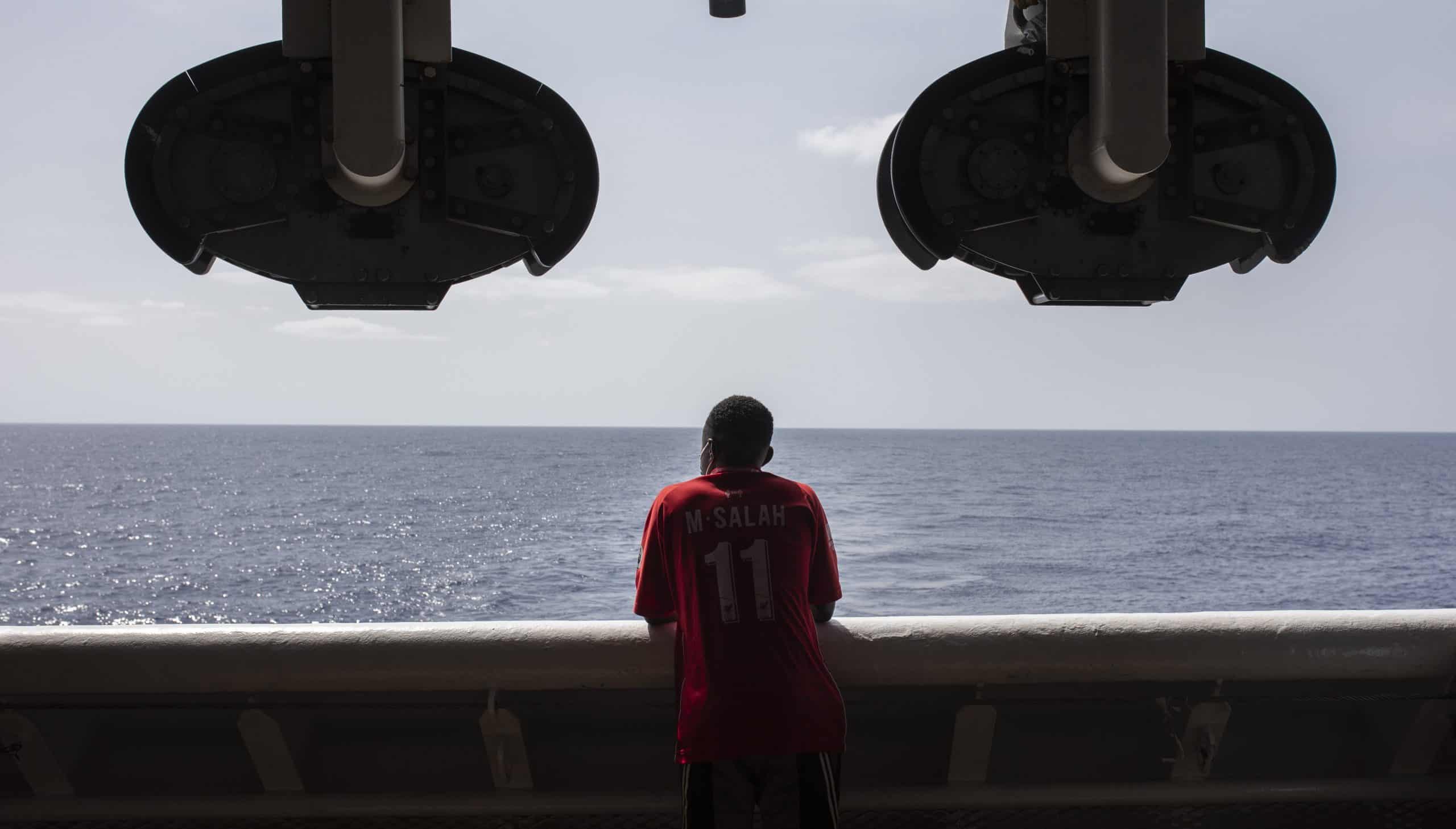MSF rescued 60 people, including six minors and 24 women, during two operations on board the Geo Barents ship on Monday 20 September.
Once safely on board, some of the survivors decided to share the stories of their horrific journeys across the desert, in transit countries, the challenges related to multiple border crossings and of the horrific abuses they suffered in Libya.
Their stories shed a light on the humanitarian crisis happening at Europe’s doorstep, which most EU states continue to ignore, and deliberately worsen through reckless policies.
Since the beginning of the year, more than 1,115 people have died or gone missing while attempting the perilous journey across the central Mediterranean. In 2021 so far, approximately 25,000 migrants and refugees have been intercepted and forcibly returned to Libya.
Sophie, Baptiste and Bienvenu
Baptiste*, 24, and Sophie*, 27, from Cameroon, were rescued and brought aboard the Geo Barents in September 2021, along with their seven-week-old baby, Bienvenu*. They undertook the journey across the central Mediterranean to find a better place for Bienvenu to live. Baptiste recounts the past months.
“In 2021, Sophie and I arrived in Libya. I had never seen people behave in such an inhumane way. We were treated worse than animals. En route, I witnessed a lot of violence, sexual violence and group rape. We finally found a hangar in a neighbourhood of the capital to live in. We found jobs, and we managed to eat something. These were really hard times, I felt desperately alone. I kept on living because of my family.
During that period, I got kidnapped and detained in a small, isolated room. The kidnappers forced me to call my mother in Cameroon to ask her to pay a ransom or I would die. My mother had to sell the small piece of land we had. It was the only thing she had left. After my family paid the ransom, they beat me again. I spent five days locked in that room before I got free. Eventually, a man managed to get me out and helped me afterwards to take care of myself.
I will always remember the day our child was born on 6 August. My wife Sophie had to give birth to our baby at ‘home’, because access to healthcare doesn’t exist in Libya for black people. We were treated like rubbish; a dog had more value than us. We had no other option than to give birth at home.”
“I found myself without any medical care,” says Sophie. “During the whole pregnancy I didn’t even know whether my baby was in good health. I was frightened. The day of the birth a neighbour came to help me, but she was more nervous than me, her arms were shaking all the time. The birth was very hard. After Bienvenu’s birth, we rarely went out as the risk of kidnapping was so high. My child didn’t receive any medical attention,” says Sophie.
“It was incredible when Bienvenu was born safely,” says Baptiste. “Only God could do that. I saw with my own eyes this unbelievable thing. I cannot describe with words what I felt when I held him in my arms. I started working even harder to get some money for medicine and food for our baby. I worked on a construction site for a man. When I learnt this man was also sending people to Europe, I explained my situation to him, and he agreed to help us.”

Ayaan
Ayaan* was rescued and brought on board the Geo Barents search and rescue vessel on 20 September, 2021. She had been travelling on a small boat along with 54 people. Once safely on board, she was seen by the medical staff, with the assistance of a cultural mediator. Some days later, she shared some of her hard experiences with the team. The scar on her neck, caused by a wire, and the one on her leg are the visible marks of this story.
Ayaan told us that she arrived in Libya in January 2020, after a long trip across Somalia, Ethiopia and Sudan. She was held against her will by smugglers in a room without windows, and didn’t have any food or water. There was only one toilet for all the women being held captive in a small and suffocating space. Ayaan remembers that once, she didn’t eat for seven days. “The smugglers’ faces were covered, we could only see their eyes. They used to stand at the door all the time with guns. Escaping was just impossible,” she says.
During her captivity, Ayaan says she was tortured constantly with wires and electricity. “They came inside the room and threw women to the floor. They took off the women’s clothes. They pulled the women’s hair badly and hit them. They tortured us all the time.”
She tells us that many people from her country were held captive, and recounts that most of them died there. “When the COVID-19 pandemic arrived, everything got even worse for me.”
She explains that torture and beatings increased, and that every day she was forced to clean the smugglers’ houses. She recounts how one day, while she was cleaning, one of the smugglers was busy taking care of his kids and she managed to run away. However, she ended up in another prison, in Zawiya. This time smugglers helped her and other Somalis to escape. While trying to escape she got injured, cutting her forehead, which left a large wound.
Ayaan is currently receiving medical care on board the Geo Barents. She tells us that she hasn’t been able to contact her family for the past six months. When asked what she expected for the future, she answered, “to find a job where I can help people in need. I want to help people”.

Kossi
Kossi*, a 34-year-old man from Togo, was rescued from a small unstable boat along with 54 other people, and brought on board the Geo Barents on 20 September, 2021. He shared some of the most painful episodes of his life with the our teams during his time on board.
“My father abandoned us; me, my mother and my three brothers. My mother had to feed us and look after us. We were extremely poor. In 2005, because of the political turmoil in Togo, I had to go into exile in Benin. I left my mother behind, it was so painful. That’s why I went back to Togo as soon as possible. But we were still really poor. In 2017, we were in such a desperate situation that I had to sleep in the bush. My friend told me to go to Libya where he could find me a job.
In September 2017, I left Togo for Nigeria, where I worked for two months to save money for the trip across the desert. On the way to Libya, I was caught by the Chadian police, along with 50 other people. When we heard the Chadian guards talking about selling us to smugglers, I managed to escape. For three days I hid in the desert until I could call a friend for help to reach Tripoli. That was in January 2018.
I started working in a carwash station to pay back the money I had borrowed from my friend. Some time later, criminal gangs broke into our house and stole everything – our mobile phones and savings. They kidnapped my friend who had helped me to travel to Libya, and since then I have not been able to contact him. I found myself alone, living in the streets. In 2020, I was robbed and attacked again. Since then, I cannot walk easily.
This September, I tried to cross the Mediterranean Sea, and I was rescued by the MSF rescue ship – the Geo Barents.
I always think about my mother. If I reach Europe and get a job – it will be for her.”
*These testimonies were collected by MSF teams on board the Geo Barents in September 2021.
*Names changed to protect survivors’ identities.
-
Related:
- Geo Barents
- Mediterranean Migration












